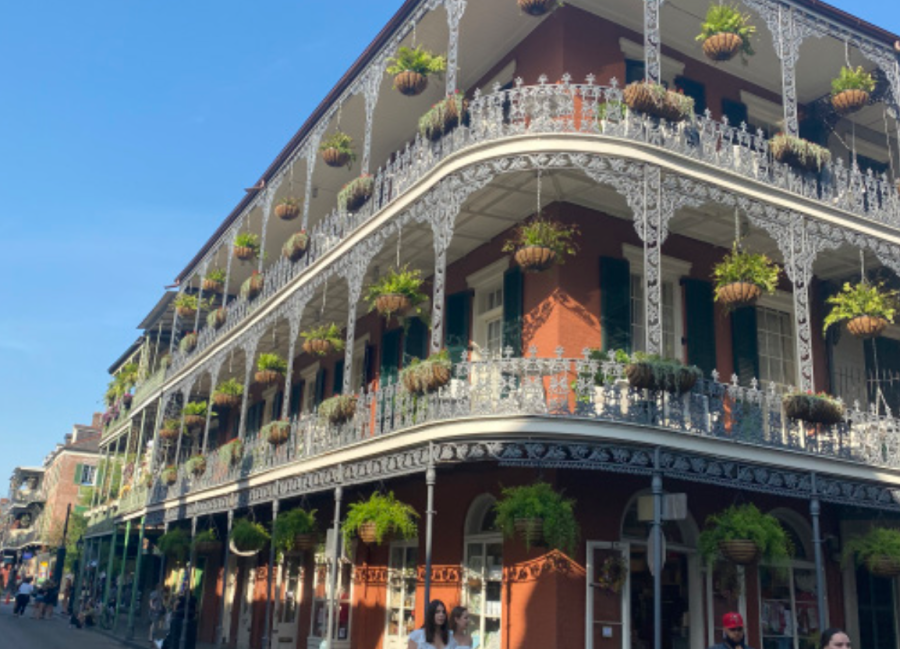Poly Shifts Approach to Ethical Service Travel
February 16, 2023
The Service Travel field has recently undergone examination in response to questions about privilege and savior complexes. This upcoming year, Poly is offering both educational curricular trips and “service” trips where students can fulfill Poly’s entire 40-hour service requirement. In the past, Poly offered more “service” trips where the requirement would be filled, and now the service hours being granted for a trip is on a case-by-case basis. “We are not trying to eliminate service altogether, but we want to make sure that we are doing it intentionally and with purpose and having conversations around it,” said Director of Upper School Sarah Bates.
Concerns about the ethics of service travel have been contemplated for years at Poly. On service trips, students can get service hours for meaningful work on a trip, which can range from direct labor serving a local community to a student’s cultural immersion. The service travel field has had to navigate accusations of “savior complexes.” These accusations include the trips being focused more on student’s gaining the personal benefits of service travel, like self-satisfaction. “One way that the field of service learning in general has changed since when I first got involved … is these concerns about what tacit messages you might be sending that may go into the broad category of savior complex and what are the implications about that in terms of stereotypes you might be unintentionally passing on,” said Director of Service Learning and history teacher Elijah Sivin.
The development of trips at Poly has changed to redefine service travel in response to concerns. “We don’t want to be like those jerky Americans who think they know better than everybody, go stay for three days and then leave,” said Bates. Student Leader of last year’s Service Travel at Poly Prep Poly Service Learning Team (SLT) Emily Melcer ’22 emphasized the importance of bringing these concerns to light. “I think that it’s important that Poly provide programming surrounding sustainable service travel because many students travel without any awareness of the harm they are causing and likely would be inclined to travel in a more sustainable way if they knew how,” she said.
This year, a winter SLT called “More Than A Checkbox” focuses on broadening and examining the service opportunities available to Poly students. One area the group concentrates on is service travel, where students research potential ethical non-profit travel organizations to present to Sivin for approval. When evaluating if an organization is right for Poly to work with, Sivin contemplates the organization’s cultural sensitivity, sustainability efforts, and whether there are meaningful personal networks involved. Rather than only selecting organizations that perform traditional physical labor, Sivin said, “The goal is to come away with better human understanding…I think there are also activities that may ultimately be more valuable to the community, [and] may be of greater service to the community than some of those more traditional options.”
Last year, a SLT titled “Service Travel at Poly Prep” was formed by student leader Melcer, and centered around the concerns of ethical service travel and what Poly can do to address them. Upon completion of the SLT, the group developed a document of recommendations for Poly’s policy on service travel that was presented to a group of students in the other SLTs, and members of the administration, including Bates. “Trips should be centered on an asset-based perspective, meaning that students should be encouraged to understand the assets that communities have, rather than deficiencies,” one of the recommendations said. The group offered advice to reach “asset-based” perspectives, such as: “sustainable options for service travel at Poly should come from connections within our community through our faculty, staff and families.” The document also offered various “reflective exercises,” where students would be asked to reflect on their impact on the community they serve before, during, and after the trip.
Sivin contemplates factors on whether or not service hours should be granted for a trip. There is a trip to France where service hours are provided. In France students have the opportunity to perform community service with the organization “Global Works,” whose website indicates that “[their] philosophy is to work WITH a community, not for a community.” Upper School DEIB Coordinator and language teacher Dr. Angela Gittens has been the trip’s chaperone and has worked with Global Works for years, following the recommendation from the SLT and Sivin to build connections with the organizations Poly travels with. The World Languages trip to Quebec and Montreal, and the Advanced Concert Choir’s trip to New Orleans do not currently have service hours.
Service Travel vs. Curricular Travel
In 2018 the term “service travel” was replaced with “curricular travel” to label travel opportunities. The “curricular travel” trip options without service elements are presented solely as an educational and immersive experience. “The goal is to match our expert faculty with all the locations in the world and at home here in the United States that can bring really to life what our students are learning,” said the Assistant Head of School, Academics Michal Hershkovitz. The current statement Poly’s website has on curricular travel is as follows: “Our curricular travel, like the classes from which it emanates, reinforces our commitment to exposing students to experiences that challenge them to grow in multifaceted ways.”
In the fall of 2019, in anticipation of the upcoming spring 2020 trips (subsequently canceled due to COVID), trips were presented on Veracross under the title “Curricular Travel.” Despite the new name, service was still indicated as curricular travel’s first and primary benefit. The first item on the list of benefits was as follows: “By completing service activities that integrate reflection and experiential learning, you will better understand and participate in the cultural, societal and ecological systems, and processes of the region you are visiting,” said on the Veracross. This statement is starkly different from the 2023 statement on curricular travel, which has no mention of service.
History teacher Timothy Shea chaperoned a service trip to Cambodia in 2018. He also planned to chaperone the curricular travel trip for the summer of ’23 before the trip’s cancellation due to a lack of student interest. “We had already been thinking about how we would revise the trip to make it more focused on curricular study so that students could have a chance to learn about Southeast Asia and learn specifically about Cambodia and Vietnam in conjunction with the classes that I teach on Southeast Asia and also global studies-type classes like International Aid and Development,” Shea said.
In contrast to this “curricular study,” which does not include service, the 2013 trip to Cambodia included service elements specifically aiding the school Poly used to be partnered with. The 2013 trip description said, “This year, we are finally going to visit the Mitapeap school, spending three days working with children using dance, music and drama to help them improve their English skills.”
Shea highlighted some challenges of performing service on the Cambodia trip. “It was always a challenge to confront service in a place where we didn’t have that connection, we didn’t have kids with language study who knew Khmer, or even kids who understood Khmer,” he said. Language barriers may also compromise the usefulness and productivity of a service trip. “Maybe service isn’t what we need to be doing in Southeast Asia,” Shea said.
These conversations and queries are not specific to Poly. Researchers have been investigating concerns about the commodification of voluntourism for years. A research article from International Journal of Tourism Research in May 2018 said “Tourism transforms the socio economical relationships to bring into market exchange amenities that were not market-based before, such as landscape, culture, fragile ecosystems, and even, as in [Vermont], social problems and poverty. Therefore, local communities can slowly become the product sold to tourism, via a tour operator.”
In addition to the commodification, there are perceived direct negatives on the local affected communities receiving the service mentioned in the research study. “Negative effects such as the neglect of the needs and desires of the local population (as priority is given to volunteers’ needs), the poor quality of the work performed by volunteers, or a decrease in employment opportunities for the locals all help to create dependency on the volunteers in the host communities.” These concerns are similar to the ones discussed in the Recommendations for service travel SLT.
However, there have been “meaningful” forms of service travel performed by Poly students in the past, including a trip Bates chaperoned in 2014 and 2016 to South Africa, according to the SLT recommendation document. “Ms. Bates shared the South Africa trip example, in which pre-existing partnerships with organizations in South Africa and purposeful opportunities for Poly students to share skills with local community members, allowed for mutual benefit,” the document said. On this trip, a local primary school had been trying to get through their national physical fitness test and needed more staff to be able to do so. Bates and the students who attended the trip worked with the local teachers and helped get the kids all through their physical fitness test. “The kids had a blast, the school and their staff were like thank you so much we needed help on this, and we were also able to provide a service that meant something,” said Bates. Hershkovitz has a daughter who attended this trip. Hershkovitz said, “That is not a trip that I could have taken her on or taught her as well as Ms. Bates, who has expertise in African history and politics.”
Poly intends to develop more ways and build connections with organizations to ensure ethical and sustainable service on trips. In hopes of finding more ways to perform meaningful service in the future, Sivin said, “I am going to work this winter with a group of students to develop a concrete list of organizations that we feel good about directing people to. We are going to generally express some concerns and say these are organizations that we feel are addressing these concerns.”
Junior Jordan Millar (managing editor of the Polygon) is in the Winter 2023 SLT “More Than A Checkbox,” with a focus area travel programs at Poly. “I research different kinds of abroad service trips that Poly students are eligible for. A big part of my research is ensuring that the travel programs I find and suggest to Sivin for approval are ethical and legitimate,” she said. Sivin evaluates the organizations presented to him, along with requests from faculty who are taking students on upcoming trips like Gittens. “If there’s an educator that I know and trust on [the trip] that makes a huge difference… I understand their educational lens so I’m very likely to agree with where they’re going or just say ‘I trust you,’” he said.


























